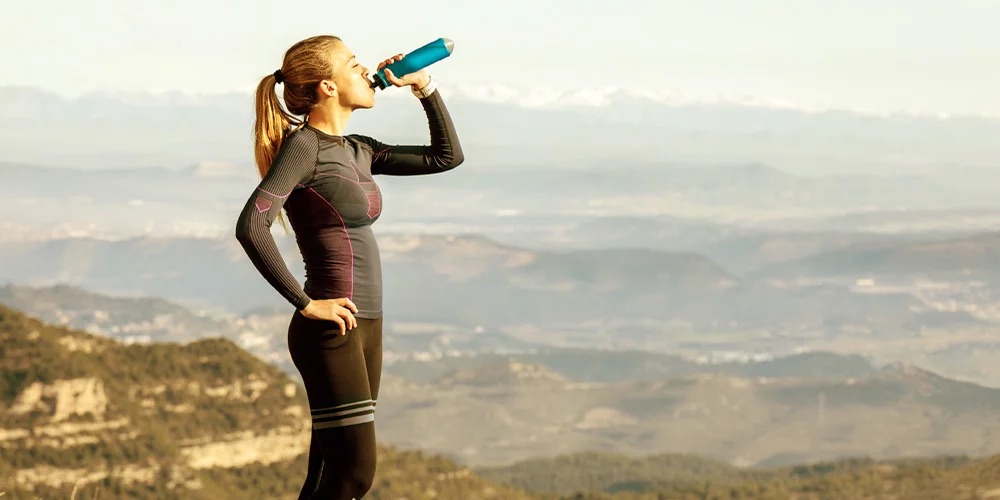For short runs of up to about 45 minutes, you can usually manage without a snack. But for longer runs, taking a suitable snack or drink can be critical for success. The prerequisite for this is a balanced diet in everyday life and a good training condition.
 Author:
Author:
Franziska Zehnder, Head of Performance Diagnostics, Sport and Exercise Scientist MAS Nutrition and Health, Medbase Zurich Löwenstrasse.
What does the body need during exercise?
To avoid dehydration (especially in warm temperatures) and the associated loss of performance, it is important to drink fluids regularly during a run. During races, it is advisable to take small amounts of water or electrolyte drinks at each aid station.
In addition, consuming foods high in carbohydrates and low in protein can help maintain performance over time. Sports drinks offer a combination of fluid and energy.
Fluid intake: recommended amounts are individual
It is important to keep your fluid balance under control. Too little or too much fluid can have a negative impact on performance. But how do I know what is the right amount for me? General recommendations cannot be given. The recommended amounts are very individual and depend on various factors such as the amount of sweat, body size, temperature, type of exertion and training condition.
For short runs, it is usually enough to drink water before and after the run. For longer runs, however, you should start drinking small amounts of fluids (e.g. electrolyte drinks) as early as possible. Even 2% water loss can lead to muscle cramps and reduced performance.
The Swiss Society for Nutrition recommends 0.4-0.8 litres of fluid per hour. However, many athletes can also rely on their gut feeling and drink according to their thirst.
Read more:
Drinking during competition: how much, when and what?
Carbohydrate intake can improve performance during runs of 45 minutes or longer
Carbohydrates are our main source of energy and are particularly important during intense and long runs. They can improve performance, delay fatigue and increase concentration. Small amounts of carbohydrates can be helpful for a duration of 45 minutes or more. The longer and more intense a run, the higher the recommended amount. Timely and regular intake can help ensure that the carbohydrates are still available to the muscles later and that performance is guaranteed until the end of the run. During training runs, carbohydrate intake can often be reduced slightly compared to competitions. If the focus is not on performance but on improving fat metabolism, it is even advisable to avoid carbohydrate intake during the run.
Carbohydrates: What is the best form?
The form in which food and thus carbohydrates are consumed is not so relevant. Preferences vary. What matters most is tolerance! Therefore, carbohydrates should be easily digestible. It is best to try out different snacks and sports drinks during training before using them at a competition. Otherwise you may get unpleasant surprises. Since the torso area is shaken a lot during running, solid foods often lead to gastrointestinal problems.
Performance diagnostics at Medbase
The sports scientists and sports physicians at Medbase check your performance level with an endurance test. Based on this, they explain to you in a clear and uncomplicated way how you can optimally incorporate the results into your training.
Book now
Dosed food intake prevents stomach problems
Our body is capable of absorbing about 1-1.5g of carbohydrates per kilogram of body weight per hour. Too much food intake can lead to stomach problems, too little energy, on the other hand, usually leads to hunger pangs and a drop in performance. From one hour onwards, about 30-60g of carbohydrates per hour are recommended, from two hours onwards and for very intense exertion, 60g.
Combining glucose and fructose
If larger amounts of carbohydrates are needed, it is essential to combine glucose and fructose. This is because our digestive tract can only absorb about 60 g of glucose per hour. Fructose, on the other hand, enters our cells via a different pathway and therefore allows for further absorption. Many sports drinks and gels contain both types of sugar anyway. However, since some athletes do not tolerate high amounts of fructose well, it is important to test the products during the training phase. It is also important to take the gels with some liquid.
Tips for practice
- Each person has to find the right sports nutrition for him or herself!
- If you prefer solid foods, Biberli, bananas, dates, Basler treats or sports bars are good energy sources. Small amounts eaten at 20-minute intervals are often well tolerated, as long as the digestive tract is used to them.
- Energy in liquid form is provided by sports drinks and gels.
- During long runs, heat and high sweat loss, you should also consume sodium via sports drinks, salt tablets, gels or solid food.
- An additional caffeine intake (e.g. through a cola) can improve concentration on the last stages of a race.
Who is Medbase?
Medbase is the largest multidisciplinary sports medicine network in Switzerland and offers specialised sports medicine services for athletes, clubs and sports federations of all activity levels in the fields of sports medicine, sports physiotherapy, performance diagnostics and training advice.


